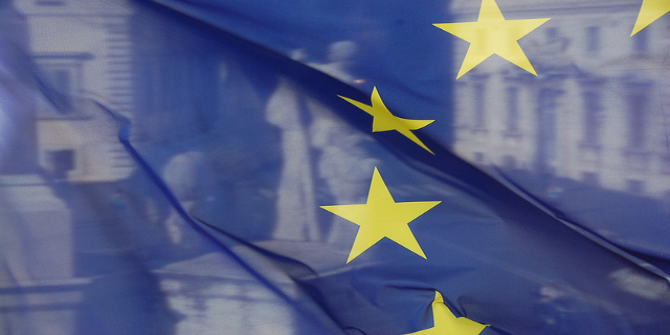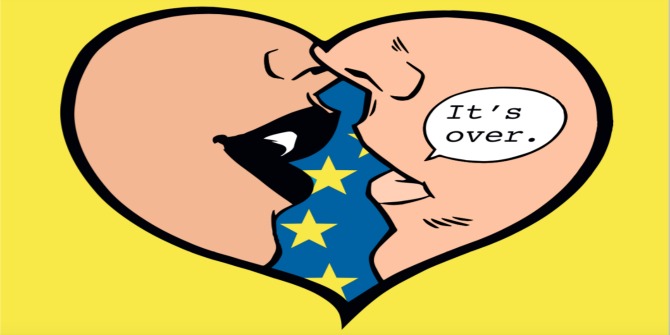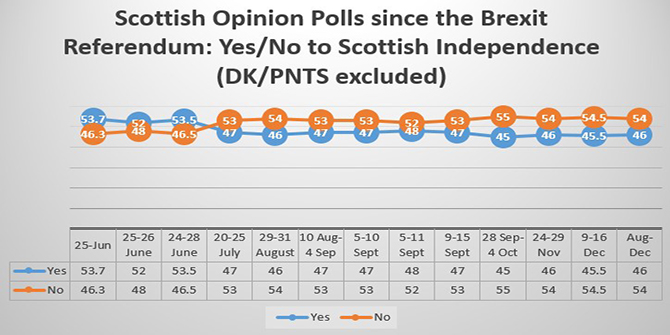 Britain has voted for Brexit but what comes next is remarkably unclear. James Strong argues that four key questions remain. When will negotiations begin? What will they focus on if those for Brexit have two main desires: to restrict the movement of people but also have the best trading relationship with the EU – which requires such freedom? And how will the post-Brexit agreement be voted in a largely pro-EU House of Commons? More interestingly, what happens if there is an early general election after a Conservative Party split, and Labour actually wins – on a pro-EU mandate?
Britain has voted for Brexit but what comes next is remarkably unclear. James Strong argues that four key questions remain. When will negotiations begin? What will they focus on if those for Brexit have two main desires: to restrict the movement of people but also have the best trading relationship with the EU – which requires such freedom? And how will the post-Brexit agreement be voted in a largely pro-EU House of Commons? More interestingly, what happens if there is an early general election after a Conservative Party split, and Labour actually wins – on a pro-EU mandate?
First, when will the Brexit negotiations begin? This morning David Cameron broke two promises he made during the referendum campaign. He resigned as Prime Minister. And he announced that he would not immediately inform the European Council that Britain wishes to withdraw from the EU, in line with Article 50 of the Lisbon Treaty. This is significant. Once a state activates Article 50, it has two years to negotiate its future relationship with the remaining 27 member states. After two years its membership terminates automatically.
Cameron’s successor, presumably Boris Johnson, will have to decide in October whether or not to invoke Article 50. Early in the campaign, Johnson suggested that Britain might yet be able to wring a better deal (e.g. further restrictions on freedom of movement) out of other EU states if the government already had a mandate to leave. Most EU leaders have ruled out this option. But that doesn’t mean they won’t consider now. Remember, most didn’t take the prospect of Brexit entirely seriously during the previous round of negotiations. And even if they did take the prospect seriously, it makes no sense from a bargaining perspective to admit that you are willing to offer more to a bargaining partner who does something you don’t want. We could yet see a second re-negotiation followed by a second referendum in which Prime Minister Johnson successfully campaigns for Remain, having achieved his primary goal by becoming Prime Minister.
Second, what sort of mandate does the leave camp have? Two key concerns appear to have driven the leave vote – fear of mass immigration and a desire to repatriate sovereign authority currently pooled with other EU states, for example the power to alter employment regulations or to negotiate new free trade deals. To an extent these concerns can both be resolved by leaving the EU. But many of those who argue for a leave vote on sovereignty grounds nevertheless still want Britain to have the best possible trading relationship with other EU states, which makes sense since most of our exports go to them. They say they would like Britain to stay in the European single market as far as possible.
Both Norway and Switzerland are in the single market but not the EU, so there is precedent here. The problem is that the rest of the EU sees free movement of people as one of the fundamental pillars of the single market. In other words, the price of retaining access to the EU market is likely to be allowing free movement of people. There is a fundamental clash between the desire to remake Britain as a free-trading nation and the desire to restrict immigration (this is true conceptually as much as in practice). So what sort of deal will the post-leave government pursue? I suspect the answer is that it will be unable to negotiate a deal because it will be unable to concede on free movement, leaving Britain outside of the single market by default at the end of its two year withdrawal period.
Thirdly, and relatedly, what sort of deal will parliament approve? Most MPs favour remaining in the EU, but they will have to sign off on any post-Brexit agreement. Will they be willing to do so in principle? Probably, given most have more respect for the electorate than is often implied. But, again, what sort of deal will they have a mandate to approve? One that retains access to the single market at the cost of allowing free movement, or one that cuts off both? The differences are stark, and the reality is that the leave vote is split between the two broad approaches. There will have to be a second referendum, like it or not.
Fourthly, what happens if there is an early general election before the two years are up? This is entirely possible, though the Fixed Terms Parliament Act sets a high bar (assuming the government does not lose a confidence vote, which it probably wouldn’t, two-thirds of MPs have to vote for an early election, which means both Labour and the Conservatives have to be confident they’ll win). It could happen if the Conservative Party splits, which looks like a realistic possibility. It could also happen if the worst economic predictions of the Remain camp come true. If the hit to business confidence already apparent in the markets continues into a recession, that in turn could undermine the government’s position.
The prospect of an early election is interesting for this reason: What if the Labour Party campaigns on a pro-EU mandate, and wins? Could a new government withdraw the Article 50 notification before the two year period is up? Article 50 doesn’t say, which means presumably the possibility is there. But it would have to be negotiated, and Europe may be in no mood for second guessing.
The Brexit debate is far from over, in other words. One way or another there will have to be a further vote.
___
This post originally appeared on LSE BrexitVote.
 Dr James Strong is a Fellow in Foreign Policy Analysis and International Relations at the London School of Economics and Political Science.
Dr James Strong is a Fellow in Foreign Policy Analysis and International Relations at the London School of Economics and Political Science.









From a systemic perspective the potential of a ripple effect and its ramifications are so huge that the EU for sure would consider embracing UK again, as this model shows: https://www.know-why.net/model/CmQ4yt7ewpFtej_VVrNFmLA Taken from the model the biggest challenge is to let people feel the benefits of the EU and let even donor countries see their return on investment. On the other hand, if the return is made explicit it would raise new challenges …
We have had our EU referendum, we know the outcome Brexit has won the argument and Britain will leave the EU. There is no justification for a further vote because to do so would be undemocratic; is Dr Strong saying that had there been a win by Remain, a second vote would have been required? I doubt it.
It will be no surprise to find the EU applying pressure on the UK to try to get Britain to stay in the EU, but the reality is that there is uncertainty whether Britain leaves, or stays. The migration crisis has been put on hold, rather than being resolved; as are the issues regarding Turkey joining the EU. The Daily Telegraph reported today June 26th “Altogether there are six European nations whose debts are larger than their economic output, and 16 that have debts larger than the 60%-of-GDP limit set out in the Maastricht Treaty”
http://www.telegraph.co.uk/news/worldnews/europe/greece/11705720/European-debt-crisis-Its-not-just-Greece-thats-drowning-in-debt.html
There is risk and great uncertainty either way for Britain if we stay in, leave the EU, the people have made their choice.. A minority of people do not want to accept the outcome of the referendum, but this is how democracy works.
I see our thoughts are on similar lines – http://www.markpack.org.uk/141722/snap-election-stop-brexit/ – though I think an early general election is more likely than you suggest. That’s because a new Conservative Prime Minister could get his MPs to vote twice in a row for a technical no confidence motion and so bring about an early election. Voting against yourself twice would be a bit odd, but easy to defend to the public: “I’ve just become PM but the voters didn’t elect me. It’s right the voters get their say now.”
In the UK, the electorate vote for their preferred local parliamentary candidate to become a Member of Parliament, voters do not directly vote for a Prime Minister, a change of PM does not trigger a General Election. There is no need to call a General Election because the Tories have a majority in the House of Commons, why would a new PM take an unnecessary risk?
The Brexit side decisively won the referendum so next Prime Minister needs to be a member of the Brexit camp, preferably Mr Gove or Mr Johnson; this outcome is the only possible democratic outcome.
Quick question: let’s say there’s a second-chance vote to remain. And the vote is to remain. Would there not be massive financial/legal ramifications against the UK for the disruption and losses incurred?
Nations leaders depend on advice from economists and no economist has the latest findings for their science which is contained in the recently published work that is titled “Let’s Conquer the Economy.” This work provides the missing factors needed to organize the confused science of economics.